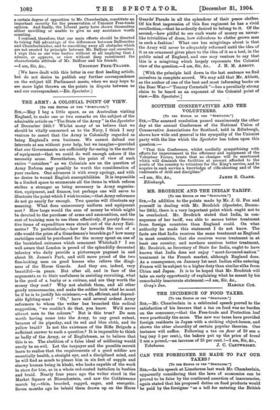SIR,—May I beg a little space, as an Australian visiting
England, to make one or two remarks on the subject of the admirable article on "The State of the Army" in the Spectator of December 24th? Whilst many of us believe that we should be vitally concerned as to the Navy, I think I may venture to assert that the Army is Colonially regarded as being England's own business. We cannot defend our interests at sea without your help, but we imagine—provided that our Governments are sufficiently far-seeing in the matter of equipment—that we could do well enough ashore if the necessity arose. Nevertheless, the point of view of such entire " outsiders " as we Colonials are on the question of Army Reform may possibly be worth the consideration of your readers. One advances it with every apology, and with no desire to wound English susceptibilities. It is impossible in a limited space to enumerate all the items in which reform strikes a stranger as being necessary in Army organisa- tion, equipment, and finance, but perhaps one will serve to illustrate the point which I wish to raise,—that Army reformers do not go nearly far enough. Two queries will illustrate my meaning. What does unnecessary uniform and equipment cost ? How large would the sum of money be which might be devoted to the purchase of arms and ammunition, and the cost of training men to use them effectively, if purely decora- tive items of expenditure were struck out of the Army Esti- mates? To particularise,—how far towards the cost of a rifle would the price of a Guardsman's bearskin go ? how many cartridges could be purchased for the money spent on one of the burnished cuirasses which ornament Whitehall ? I am well aware that London is proud of the splendidly decorated infantry who daily provide a picturesque pageant in and about St. James's Park, and still more proud of the two fine-looking men on good horses who relieve the dingi- ness of the Horse Guards. And they are, indeed, very beautiful—in peace. But after all, and in face of the arguments as to their usefulness in assisting recruiting, what is the good of a busby or a cuirass, and are they worth the money they cost ? Why not abolish them, and all other gaudy unnecessaries, and make the soldier look what he must be if he is to justify his existence,—a fit, efficient, and depend- able fighting-man? "Oh," have said several ardent Army reformers to whom the writer has broached this radical suggestion, "we couldn't do that, you know. We'd never attract men to the colours." But is this true ? Do men worth having come into the Army, to any great extent, because of its pipeclay, and its red and blue cloth, and its yellow braid ? Is not the existence of the Rifle Brigade a sufficient answer to such a question ? It is impossible to think so badly of the Army, or of Englishmen, as to believe that this is so. The abolition of a false ideal of soldiering would surely be no evil. Let the taxpayer and the possible recruit learn to realise that the requirements of a good soldier are essentially health, a straight eye, and a disciplined mind, and he will find as much to please him in six feet of supple and sinewy human being in khaki, who looks capable of the work in store for him, as in a whole red-coated battalion in busbies and braid. Nearly four years ago the writer stood in the Market Square at Bloemfontein, and saw the Coldstreams march by,—thin, bearded, ragged, eager, and energetic. Seven months ago he beheld them drawn up on the Horse Guards' Parade in all the splendour of their peace clothes. Of his first impression of this fine regiment he has a vivid recollection,—that he ardently desired to belong to it. Of the second,—how pitiful to see such waste of money on unwar- like trivialities of dress, how ridiculous to clothe grown men in such a fashion! What one has misgivings about is that the Army will never be adequately reformed until the idea of it as an ornament gives place to the idea of it as a tool, in the public mind of England, and one may venture to say that this is a misgiving which largely represents the Colonial
view of the question.—I am, Sir, &c., J. H. M. ABBOTT.
[With the principle laid down in the last sentence we find ourselves in complete accord. We may add that Mr. Abbott, as the author of one of the best and most informing books on the Boer War—" Tommy Cornstalk "—has a peculiarly strong claim to be heard as an exponent of the Colonial point of view.—En. Spectator.]


































 Previous page
Previous page